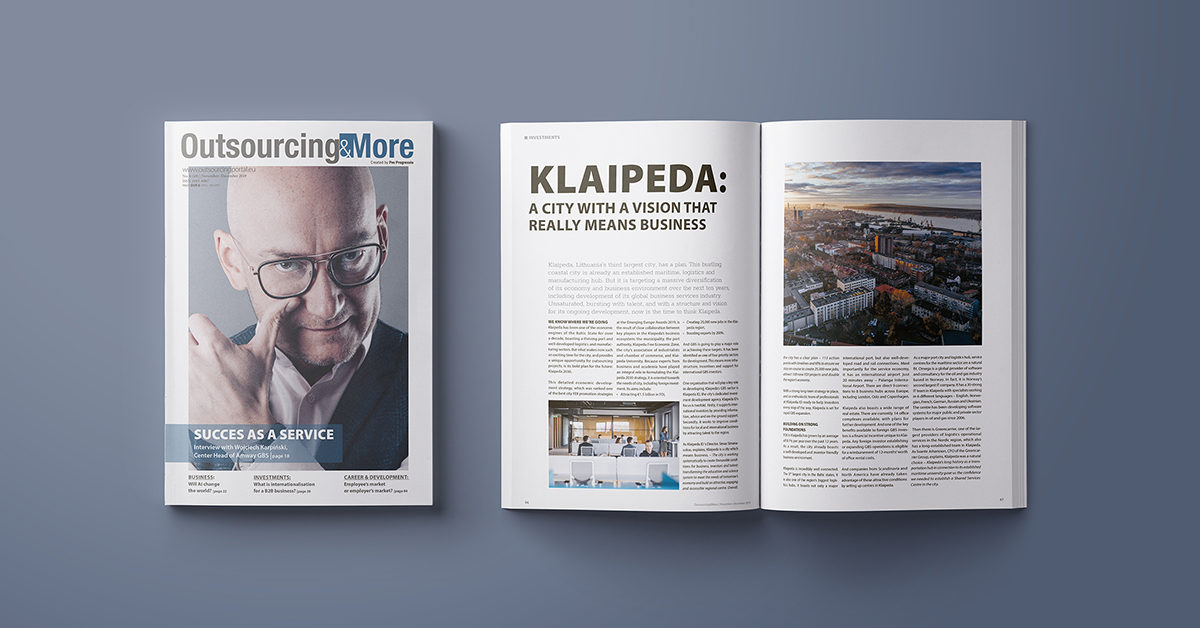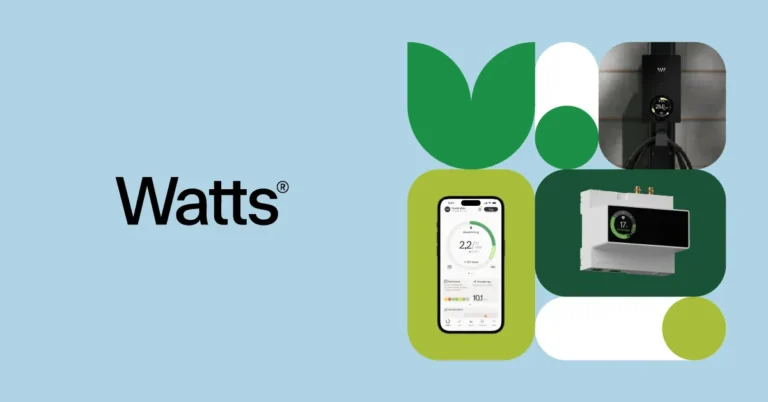The following article by Invest Lithuania’s Investment Advisor Dalia Liesytė first appeared in the Outsourcing&More magazine. You can find the original here.
Klaipeda, Lithuania’s third largest city, has a plan. This bustling coastal city is already an established maritime, logistics and manufacturing hub. But it is targeting a massive diversification of its economy and business environment over the next ten years, including development of its global business services industry. Unsaturated, bursting with talent, and with a structure and vision for its ongoing development, now is the time to think Klaipeda.
We know where we’re going
Klaipeda has been one of the economic engines of the Baltic State of Lithuania for over a decade, boasting a thriving port and well-developed logistics and manufacturing sectors. But what makes now such an exciting time for the city, and provides a unique opportunity for outsourcing projects, is its bold plan for the future: Klaipeda 2030.
This detailed economic development strategy, which was ranked one of the best city FDI promotion strategies at the Emerging Europe Awards 2019, is the result of close collaboration between key players in the Klaipeda’s business ecosystem: the municipality, the port authority, Klaipeda Free Economic Zone, the city’s association of industrialists and chamber of commerce, and Klaipeda University. Because experts from business and academia have played an integral role in formulating the Klaipeda 2030 strategy, it is oriented towards the needs of city, including foreign investment. Its aims include:
- Attracting €1.5 billion in FDI,
- Creating 25,000 new jobs in the Klaipeda region,
- Boosting exports by 200%.
And GBS is going to play a major role in achieving these targets. It has been identified as one of four priority sectors for development. This means more infrastructure, incentives and support for international GBS investors.
One organisation that will play a key role in developing Klaipeda’s GBS sector is Klaipeda ID, the city’s dedicated investment development agency. Klaipeda ID’s focus is twofold. Firstly, it supports international investors by providing information, advice and on-the-ground support. Secondly, it works to improve conditions for local and international business by attracting talent to the region.
As Klaipeda ID ‘s Director, Simas Simanauskas, explains, Klaipeda is a city which means business.
“The city is working systematically to create favourable conditions for business, investors and talent; transforming the education and science system to meet the needs of tomorrow’s economy and build an attractive, engaging and accessible regional centre. Overall, the city has a clear plan – 113 action points with timelines and KPIs to ensure we stay on course to create 25 000 new jobs, attract 100 new FDI projects and double the region’s economy.”
With a strong long-term strategy in place, and an enthusiastic team of professionals at Klaipeda ID ready to help investors every step of the way, Klaipeda is set for rapid GBS expansion.
Building on strong foundations
FDI in Klaipeda has grown by an average of 8.1% per year over the past 12 years. As a result, the city already boasts a well-developed and investor friendly business environment.
Klaipeda is incredibly well connected. The 5th largest city in the Baltic states, it is also one of the region’s biggest logistics hubs. It boasts not only a major international port, but also well-developed road and rail connections. Most importantly for the service economy, it has an international airport just 20 minutes away – Palanga International Airport. There are 9 connections to 8 business hubs across Europe, including London, Oslo and Copenhagen.
Klaipeda also boasts a wide range of real estate. There are currently 14 office complexes available, with plans for further development. And one of the key benefits available to foreign GBS investors is a financial incentive unique to Klaipeda. Any foreign investor establishing or expanding GBS operations is eligible for a reimbursement of 12-months’ worth of office rental costs.
And companies from Scandinavia and North America have already taken advantage of these attractive conditions by setting up centres in Klaipeda.
As a major port city and logistics hub, service centres for the maritime sector are a natural fit. Omega is a global provider of software and consultancy for the oil and gas industry based in Norway. In fact, it is Norway’s second largest IT company. It has a 30-strong IT team in Klaipeda with specialists working in 6 different languages – English, Norwegian, French, German, Russian and Ukrainian. The centre has been developing software systems for major public and private sector players in oil and gas since 2006.
Then there is Greencarrier, one of the largest providers of logistics operational services in the Nordic region, which also has a long-established team in Klaipeda. As Svante Johansson, CFO of the Greencarrier Group, explains, Klaipeda was a natural choice: “Klaipeda’s long history as a transportation hub in connection to its established maritime university gave us the confidence we needed to establish a Shared Services Centre in the city.”
One of 12 offices the company has internationally, the Klaipeda centre provides full financial services and centralized logistics operational services to clients in the Nordic and Baltic region.
Founded in 2013, the centre now employs 54 staff and has some distinctive characteristics. First, there is innovation. The Klaipeda office was the first in the Greencarrier group to pilot Robotic Process Automation (RPA), which is used for booking incoming payments. Secondly, there is the centre’s focus on sustainability and the environment.”
Alongside maritime SSC, IT companies are also exploring Klaipeda’s potential. US software developer Exadel, which counts the likes of Google, Samsung, Deutsche Bank and eBay among its clients, is the latest arrival to Klaipeda’s shared services ecosystem. The number one software developer in the Denver area, Exadel’s appery.io app is used by half a million developers around the world. Its Klaipeda team provides full-cycle software development to clients in a broad range of industries.
The centre’s presence is already playing a role in transforming the talent pool in Klaipeda, according to Managing Director, Dmitrijus Bereščanskis. Having started operations in Lithuania’s capital Vilnius, Exadel quickly spotted Klaipeda’s potential. “We noticed that many good programmers from Klaipėda move to Vilnius for work,” explains Mr Bereščanskis. “These talents were willing to relocate from Vilnius to Klaipėda, which influenced the decision to open the Shared Services Centre in Klaipėda.” As the company states, it has developed a close collaboration with the city “symbiotic relationship with Klaipėda University enabling us to expand our presence and strengthen the IT talent pool in Klaipėda.”
Fresh impetus
The success of international service centres is being fuelled by a strong talent pipeline. More than two thirds of the working population has a higher education degree. In total, the city boasts 8 higher education institutions offering over 250 study programs – IT, Creative Industries, Management, Law and Finance are among the most popular areas of study in Klaipėda. Klaipėda University’s course in IT and Mechanical Engineering are rated the best in the country, while LCC International University offers courses taught exclusively in English to its predominantly international student base.
As well as being highly educated, Klaipeda’s population is also young and multi-lingual. 47% of the population is under 40, and a majority of these young people speak English. In general, 80% of Klaipėda’s citizens speak at least one foreign language, with German being a common language thanks to the city’s Hanseatic origins.
Low saturation means an ocean of opportunities await
One of the most significant features about Klaipėda is that, thanks to low saturation levels, there’s plenty of talent to go around. And this is especially true when it comes to Global Business Services. As Vadim Narožnij, head of Omega’s Klaipeda centre explains, “the jobs market is not yet as saturated as in other big Lithuanian cities, so it is easier to create stable, long-lasting relations with employees.” Svante Johansson, CFO of Greencarrier’s Lithuanian operations, concurs. “The fight for talent was less intense in Klaipėda than in the Baltic capitals, ensuring better odds for recruiting and retaining good staff,” points out Mr Johansson.
The result is a city that is ready to take off. Its strong foundations, developed infrastructure, and existing FDI ecosystem mean international companies can hit the ground running. Scaling and growth will be rapid, thanks to a strong talent pipeline and low saturation. And tying it all together is an award winning economic development strategy that means an investment in Klaipėda is an investment in the future.













